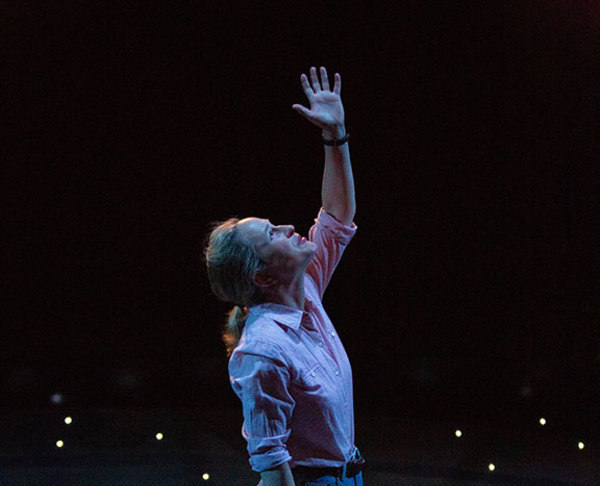Play Explores Ups, Downs and ‘Remarkable’ Life of 1st Female Astronaut Candidate in US
By Samantha Tatro
The life of late pilot Jerrie Cobb – America’s first-ever female astronaut candidate – was filled with ups and downs in a time in history where sexism kept her from reaching the stars, despite her skills.
“One of the most remarkable things about her story is that no one knows her story,” said actress Morgan Hallett, who portrays Cobb in a new play about her life, currently on stage at The Old Globe in Balboa Park.
Hallett, who last appeared in The Old Globe’s “Time and the Conways,” steps on stage eight times a week as Cobb in “They Promised Her the Moon.”
The play, written by Laurel Ollstein, tells the true story of Cobb’s life and career.
Cobb passed away in March at age 88 following a brief illness; her death was confirmed for the first time on Thursday.
In 1961, Cobb became the first woman to pass astronaut testing, outperforming many male candidates. The pilot was one of the Mercury 13, a group of 13 women who passed the strenuous physical testing to become astronauts.
However, the Mercury 13 never went to space; NASA had already appointed its Mercury 7 astronauts, all men, despite the women’s qualifications.
Even though Hallett plays Cobb, she only learned of Cobb’s incredible story once she picked up the script for the play — much like the many people now learning of Cobb’s accomplishments following her death.
“The fact that someone had accomplished so much at a time when women accomplishing things was kind of a big deal…it’s kind of amazing that in 2019, we still don’t know who she is and who the rest of the women who were involved with the Mercury 13 are,” Cobb said.
Instead of becoming an astronaut, Cobb became a consultant for NASA’s space program. Despite her shy nature, Hallett said, she was vocal about the frustrations she faced.
NASA dismissed her one week after she commented: “I’m the most unconsulted consultant in any government agency.”
Cobb ended up testifying in 1962 before a Congressional panel, a year after she passed the test to become an astronaut. “They Promised Her The Moon” playwright Laurel Ollstein used many of these excerpts from the Congressional panel verbatim.
For many audience members, Hallett said, hearing some of the overt sexism is jarring.
“For men in the audience, often it’s quite astonishing to hear men that they idolized, perhaps, men of their age, and their opinions and attitudes toward women and women specifically in the space program,” Hallett said. “I think sometimes just hearing those quotes, hearing what people actually felt and said, is pretty eye-opening.”
“You think, ‘There’s no way, people didn’t really say that, people didn’t really think those things,’ but sometimes the truth is more appalling than fiction,” Hallett added.
In her testimony to a special House subcommittee on the selection of astronauts, Cobb said the women of Mercury 13 only wanted a place in space “without discrimination.”
Cobb’s story serves as an inspiration to many who see it unfold live on stage. But for some audience members, Hallett said, it also serves as an eye-opening reminder for how far society still has to go.
“This is a very positive and uplifting play in a lot of ways, in most ways, but I do think there is that seed of: this is what happened and it was a real tragedy and we have to keep our wits about us, because it’s still happening in certain ways,” Hallett said.
Cobb’s story became all the more awe-inspiring to Hallett when she learned in rehearsals how shy and soft-spoken the pilot was throughout her life. Cobb did not like the limelight and shied away from attention and notoriety.

